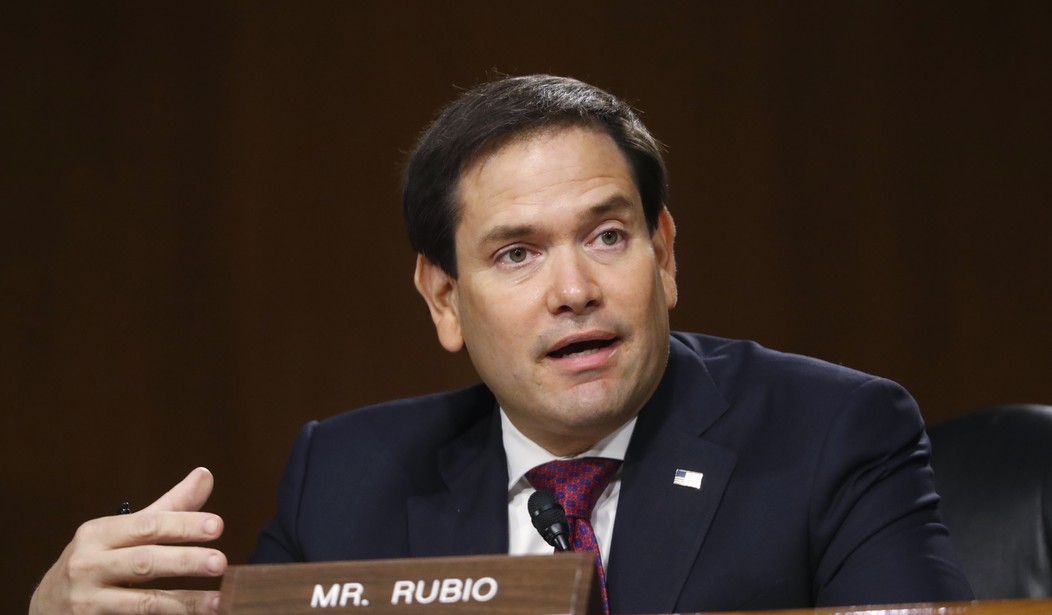Since his election to the U.S. Senate in 2010, Sen. Marco Rubio (R-Fla.) has been a steadfast champion of private property rights. Driven by many of his constituents’ horrific experiences living under communism, Sen. Rubio has taken a strong stand against eminent domain, intellectual property infringement, and taxes and regulations that make it difficult for people to pursue their livelihoods and the American Dream. Now, by continuing his commendable stand for property rights by standing firm against Venezuela’s vile expropriation schemes, the lawmaker has a chance to help the victims of Venezuela’s socialist regime reclaim property that was stolen from them.
Under the ruthless socialist regimes of Hugo Chavez and Nicolás Maduro, companies with promising prospects have had their assets forcibly taken from them. In particular, Crystallex, a publicly-owned Canadian mining company with a large number of American investors, has borne the brunt of widespread government theft in Venezuela. The business was first given mining rights to “Minas Las Cristinas” roughly two decades ago. The company subsequently invested hundreds of millions of dollars in getting mining operations off the ground. Crystallex employed hundreds of Venezuelans to build out infrastructure, conduct environmental feasibility studies, and construct healthcare facilities. The privately-owned mine was going to be an economic boon to Venezuela.
Unfortunately, strongman Hugo Chavez couldn’t resist forcibly seizing the mine and its estimated 17 million ounces of gold (valued in the billions of dollars). In 2011, the socialist regime announced the nationalization of the mine and the seizure of Crystallex’s investments in the country. Sen. Rubio has led the charge in condemning these despicable antics, taking the ruthless government to task for having, “violated the rule of law, committed egregious human rights violations, and undermined democratic order.”
Despite these condemnations, the socialist government has continued their wanton expropriations while ignoring the claims of the victims. Crystallex has spent years trying to reclaim what is rightfully theirs, but the regime has refused to cooperate. In 2016, the World Bank’s international arbitration facility in Washington ruled that Maduro’s government owes Crystallex $1.4 billion in restitution. Yet, four years later, the socialist regime has yet to repay Crystallex the funds it stole from them.
Recommended
Fortunately, there may be a more promising path for victims of expropriations looking to get their due from Venezuela. Even if individuals and companies cannot go to Caracas to demand restitution, they can stake their claims against a $10 billion business called Citgo that is owned by the Venezuelan government and operates in the U.S. This was made possible in a 2019 decision by the U.S. Court of Appeals for the Third Circuit that gave Crystallex the green light to claim shares of this government-owned enterprise. The Venezuelan government tried to reverse this ruling, but the Supreme Court declined to take up their appeal.
That should have been the end of the matter, but there remains one significant obstacle to Crystallex reclaiming what is rightfully theirs: approval by the United States Treasury Department. Claiming Citgo’s assets would require final approval from the U.S. Treasury, but the Treasury's Office of Foreign Asset Control has stubbornly refused to give the go-ahead. Senator Rubio has opposed allowing a group of bondholders that lent money to Maduro to be compensated by using Citgo as an asset. However, he has been silent on Crystallex’s property, which was an investment to build a significant mine in Venezuela and not a loan to finance the treasury of Maduro’s Venezuela.
Fortunately, there’s still time for the Florida lawmaker to do what’s right by urging the Treasury Department to move forward with the licensing process to help Crystallex reclaim their stolen property. The company continues to ask U.S. courts to enforce their claims against Citgo, but courts are unlikely to acquiesce without Treasury approval. Sen. Rubio and his legislative allies have close ties to the Trump administration and are in a unique position to press the administration to act on this critical issue.
Senator Rubio could also encourage Crystallex and Venezuela to reach a mutually agreeable settlement that keeps Citgo in Venezuelan hands while compensating Crystallex by different means. Such an arrangement could yield a major political victory to opposition leader Juan Guaidó while showing that the United States will respect property rights around the world.
A number of free-market organizations have supported Crystallex’s claims because continued refusal to act would spell disaster and set a disturbing precedent of disregarding private property rights. We call on Senator Rubio to use his position of leadership to support a path forward that promotes both the U.S.’s steadfast support for democracy in Venezuela and our nation’s protection of property rights. Policymakers must embrace the rule of law and ensure that victims of socialist theft get their due.
Ross Marchand is a senior fellow for the Taxpayers Protection Alliance.

























Join the conversation as a VIP Member